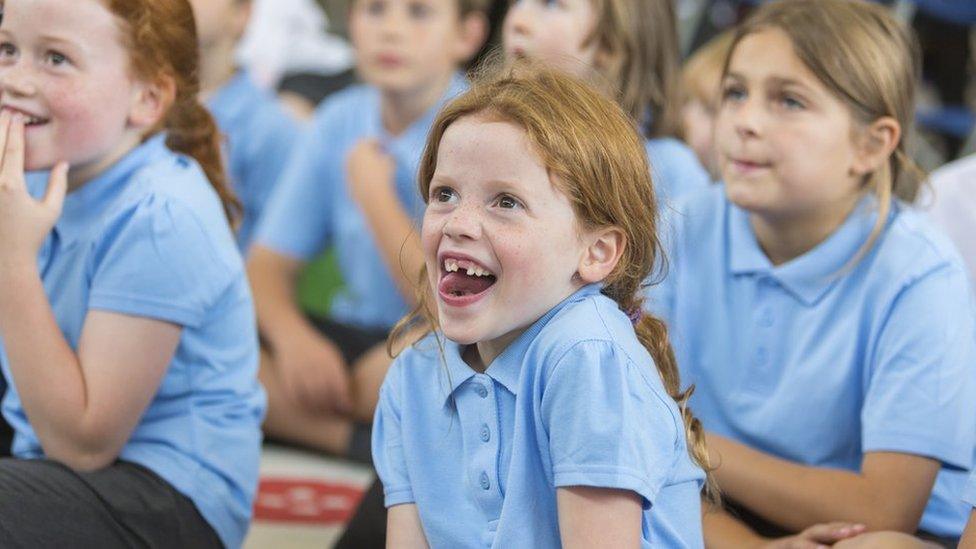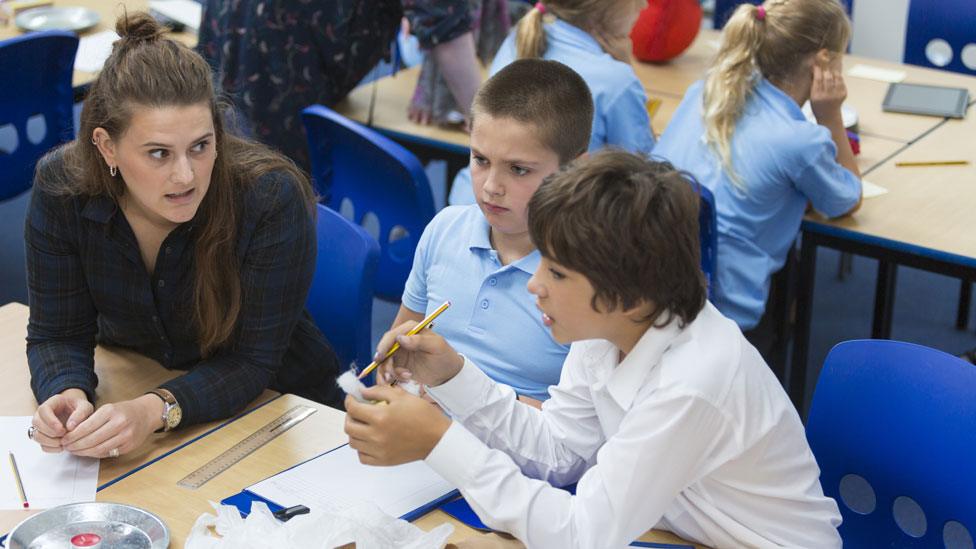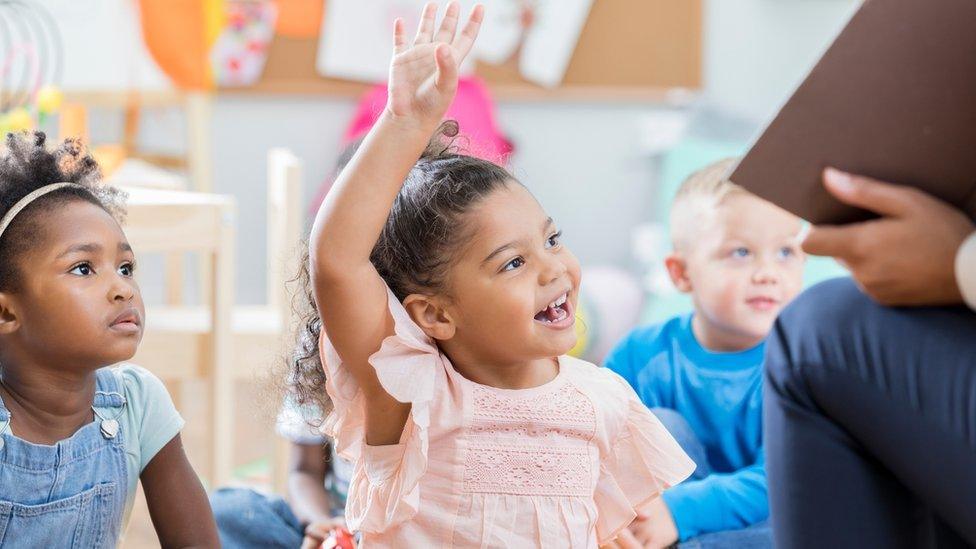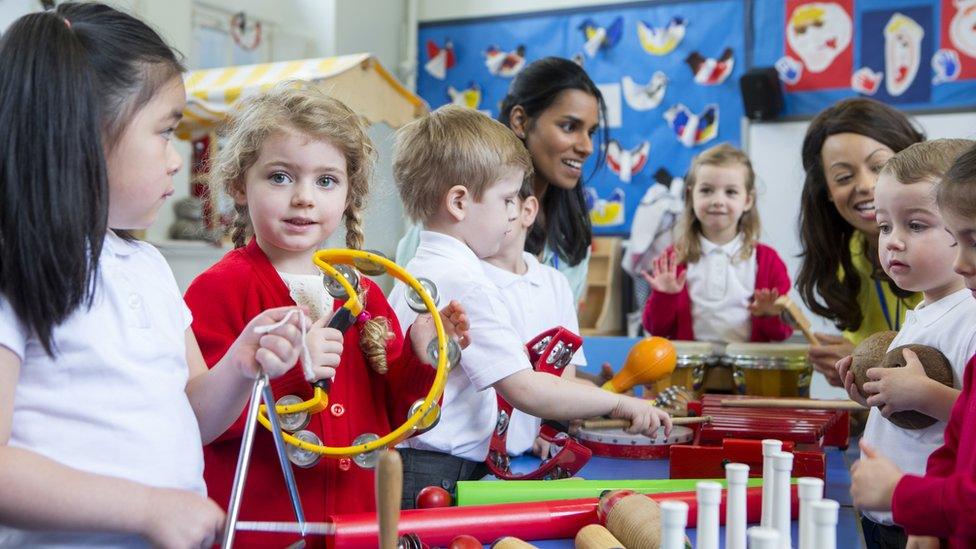Coronavirus: Doctors' union says it's too soon to reopen schools
- Published

Doctors have backed teachers' unions by saying Covid-19 infection rates are too high for England's schools to reopen.
The British Medical Association said teachers and heads were "absolutely right" to urge caution and prioritise testing to avoid a second spike.
It comes after teachers' unions met the government's scientific and medical advisers to express concerns about the planned phased reopening from 1 June.
The NASUWT union said no school should reopen until it could show it was safe.
England is the only UK nation to set a date for schools to start to reopen.
Education Secretary Gavin Williamson has insisted schools would only open their doors more widely when the conditions were right to do so, with the earliest date being 1 June.
He said he had wanted to give head teachers and parents several weeks to plan for the event.
Steve Chalke wants Oasis trust schools to reopen in June
The governments in Wales, Scotland and Northern Ireland have stepped back from setting a firm date.
But since the prime minister announced there was to be a gradual lifting of lockdown measures, plans for the phased reopening from the beginning of next month seem to have hardened.
After the meeting between the National Education Union and other teaching unions, and the government's top scientific advisers, Mr Williamson said schools would have all the "guidance and support they will need".
However, teachers' unions say they still have "unanswered questions" about how pupils can be invited back and managed safely.

When schools return they will have to introduce smaller classes and keep pupils apart
NASUWT general secretary Patrick Roach said: "No information was provided to change the widely held view that the evidence base for opening schools from 1 June is weak."
He added: "No evidence was provided at the meeting and there was no clarity about when it will be provided."
The British Medical Association said with so much "conflicting" evidence on opening schools, it was "completely aligned" with teachers' union calls to delay reopening.
"Until we have got case numbers much lower, we should not consider reopening schools," said a letter from the BMA's council chair.
It added there was still too little clear evidence on the extent to which children were carriers of the disease, even though they usually got fewer and less serious symptoms than adults.
Speaking after the meeting NEU joint general secretary Kevin Courtney welcomed a promise to publish the scientific evidence on school reopening plans.
But he called for a clarification over what thresholds would be used to judge if it was safe to open up.
And he asked how it would be measured whether reopening increased the rate of infection in the wider community.
His union is one of nine opposed to reopening schools on 1 June.
But Mr Williamson said: "I want to reassure parents and families that we are giving schools, nurseries and other providers all the guidance and support they will need to welcome more children back in a phased way and no earlier than 1 June."
The DfE proposed teaching pupils in small groups of 15 or fewer and keeping them apart from other children during the school day to limit the spread of any infection, as well as maintaining good hygiene and hand washing.
But one of England's biggest academy trusts has become one of the first school groups to say it will reopen from 1 June.
Steve Chalke, founder of the Oasis trust which has 35 primary schools, says opposition to reopening fails to recognise the harm to disadvantaged children from missing school.
Mr Chalke, whose schools on average have 45% of children eligible for free school meals, said: "The greatest risks for many of our children are being stuck in a council block, with no fresh air, no exercise, little or no nutritious food."
Mr Chalke said the schools would not be "forcing anyone to attend", either pupils or staff, adding safety measures would be in place.
But he stressed that the "long-term social cost" of not opening would "outweigh any short-term medical risks".

Parents' view: 'Our children need space to learn'
Graham Gallagher and his wife Leanne have three young children with special needs.
He says schools reopening on 1 June would "benefit the whole family", who live in a two-bedroom flat in Walsall in the West Midlands.
He feels their children aren't getting a "valuable learning experience" at home and worry they could regress from the "solid progress" they have made during this school year.
At home, the children struggle to concentrate for more than an hour at a time, and Leanne is struggling to manage the learning of all three children at once.
Schools reopening would allow the children to learn and socialise in a distraction-free environment with more space and access to an outdoor area.
He says the couple share teachers' concerns that they need to be "properly protected", and hopes "plans will be put in place" to alleviate their worries.


LOCKDOWN: How are businesses coping?
EVERYDAY HEROES: Stacey Dooley is on the hunt

Teacher's view: 'Too early' to reopen schools
Primary school teacher Mary Newton, 49, says she "feels very strongly" that June is "far too early" to reopen schools.
Her husband John, 56, who runs an educational books company, has been shielding at home after a recent heart attack and Mary says their children returning to school would be a concern for his health.
They plan to keep their two children - who are in Years 4 and 6 - at home for as long as they can.
She says it could be "catastrophic" for a child's mental health if they contracted the virus and transmitted it to a family member who became very ill from it.
Children could be "traumatised" by the new rules that would have to be adhered to and staff would be anxious, she adds.
"I believe schools should continue to support children of key workers and those most vulnerable", she says, "but I certainly won't be sending my Year 6 child back to school in June".


LOOK-UP TOOL: How exposed is your job?
EXERCISE: What are the guidelines on getting out?
THE R NUMBER: What it means and why it matters
UK SPREAD: How many cases in your area?

- Published14 May 2020

- Published11 May 2020
